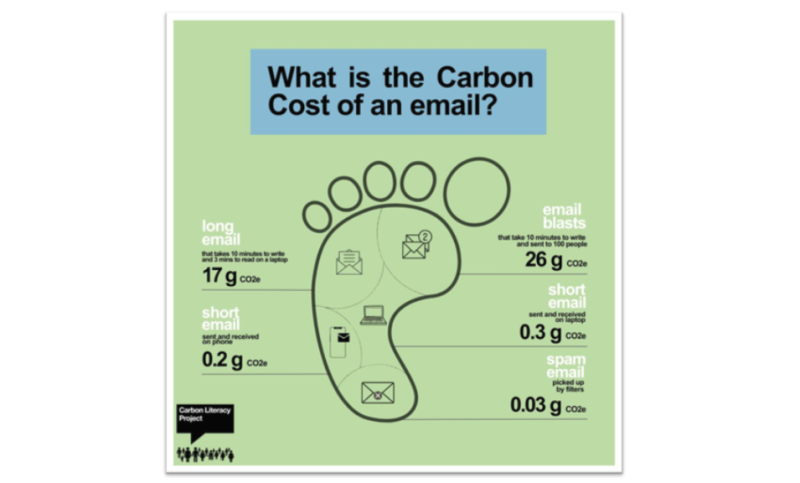How dirty are your digital bad habits?

by David Crews, Director IT Service & Support
As the lead for the new CIO-P Sustainability Workstream, I thought I would enlighten you all with some dirty facts that I discovered as part of my Carbon Literacy Course (which by the way is fantastic and I honestly would encourage you to sign up – more on that later).
In his latest edition of How bad are Bananas?, Professor Mike Berners-Lee's revised estimates state that an individual email can release between 0.03g CO2 to 26g CO2 into the atmosphere. If you receive (or are bad enough to even send!) one of those long emails containing an interminable and tedious PowerPoint attachment to lots of people, this could significantly increase the amount of carbon to as much as 50g of CO2.
My top 5 tips for cleaning up your dirty digital habits will not only lead to you to having a much purer digital life will collectively contribute to helping our planet and lowering the OU’s carbon footprint:
Use document links instead of email attachments.
Switching from attachments to document links can reduce CO2 emissions by a flabbergasting 92%, or from 50g to just 4g of CO2 if you are being extremely dirty! Try using OneDrive to share documents instead of adding them as an attachment.
Think before you thank!
In late 2019, energy supply business OVO Energy calculated that each round of “thank-you” emails sent by the adult population of the UK alone produced the carbon equivalent of 81,152 flights between Heathrow and Madrid. So, just do it via Teams! Then you can send those emojis :), gifs, LOLs, cheers, have a great weekend – all those classic phrases and save a few flights worth of carbon.
Give it a rest!
A turned-off computer uses at least 65% less energy than one left on or idle on a screen saver. So, at the end of the day unplug it, give your eyes a rest, and go outside.
Clean out your inbox regularly.
Delete emails you won’t need again and unsubscribe from those any annoying mailing lists. Why not clean up your inbox now, and remember to empty your deleted items folder regularly! Especially from all those people expressing their endless thanks for all your efforts!
Save bookmarks for websites that you use often.
It’s quicker and more efficient, and you won’t need to use a search engine. A couple of searches using Google are thought to generate around 14g of CO2, which is equivalent to boiling a kettle (c.15g of CO2).
While you’re at it, why not switch your default search engine to Ecosia, the search engine that plants trees when you search.
If these tips have whetted your appetite for further information, check out this simple Email CO2 Calculator. It will consider basic factors about how often you use your email and give you a rough estimate of how much CO2 you produce each year just from email.
If you’re interested in signing up for the Carbon Literacy Course. Complete the Carbon Literacy Training Expression of Interest Form now.
Related articles
- Introducing a new free course - Climate Psychology: facing the climate crisis 8th February 2024
- Climate Change and machine learning - Climate Perspectives 8th February 2024
- Go Green: What is eco-anxiety? 8th February 2024
- Go Green: Fashion Fixing and Mending 8th February 2024
- OU rises in People and Planet League 13th December 2023